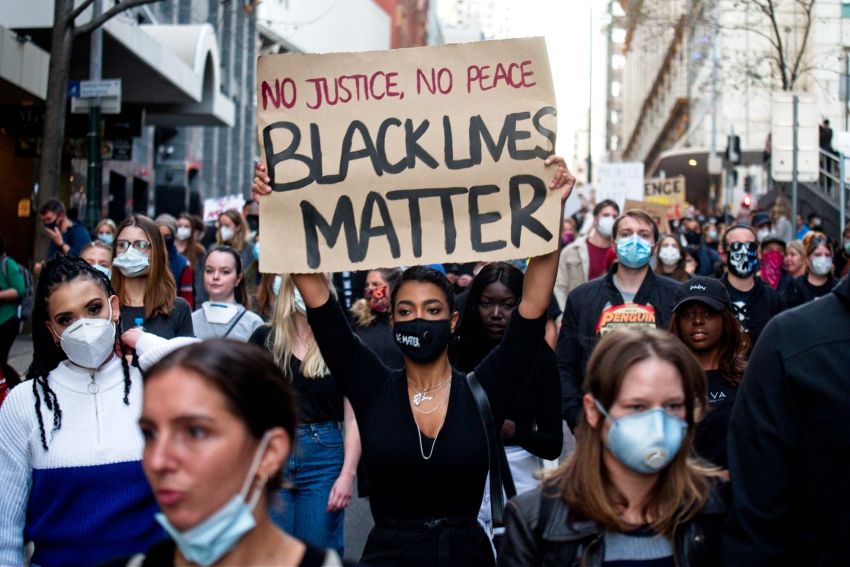
“It isn’t illegal to be Black” was a favourite placard at the huge Black Lives Matter protest in Melbourne on June 6. This is because racist policing is now routine and the police, generally, have government backing.
Protests have exploded across the world in solidarity with the Black Lives Matter movement in the United States, which itself has exploded since the racist murder of George Floyd on May 25. Every country has its own experience of racism and police brutality.
Many at the Australian protests carried signs highlighting the injustice of 432 Aboriginal deaths in custody since 1991, with no convictions laid. There were many deaths in custody before the Royal Commission into Aboriginal Deaths in Custody produced its final report that year.
Shamefully, by June 6, that figure had grown to 437, with an Aboriginal man in custody in Perth dying that day.
A few days before, a video of NSW Police kicking an Aboriginal teenager to the ground, while his hands were behind his back, angered many. The young man toppled onto the pavement head first, with force, and without any means of breaking the fall. This was wanton violence — equivalent to the “coward’s punch” which has been made illegal in a number of Australian states. An Aboriginal woman was reported to be in a critical condition on the weekend of the protests, after being body-slammed by prison guards in Perth.
Shortly after the nationwide protests, it came to light that a 4-year-old Aboriginal girl, walking around Big W in South Australia with her family, was grabbed by a store worker and accused of stealing. The family’s three small children were wearing new clothes, a gift from their grandparents. Their father spoke out against the racist assumptions, saying that just because an Aboriginal person wears new clothes does not mean they stole it.
Racism is not only directed against Aboriginal and Torres Strait Islander people: young people of African descent report they are treated in a similar racist way by police. Refugees and asylum seekers in detention have similar experiences.
The Black Lives Matter-Stop Black Deaths in Custody protests across Australia in the first week of June were very big in the capital cities. But they also struck a chord in regional centres, with protests in Ballarat, Wagga Wagga, Mildura, Townsville, Cairns, Katoomba, northern NSW and elsewhere.
They reveal a new level of anger — especially among young people — against racism, particularly from law enforcement authorities.
In the United States, despite the police brutality, the Black Lives Matter protests are becoming more widespread and more sustained. People are concluding, correctly, that only mass protests have a chance of delivering change. This is giving the movement more power.
Rarely are racist police or people who kill Black Americans charged unless there are protests. Despite the lynching of Ahmaud Arbery, in February, being filmed, it took Black Lives Matter protests to force the local district attorney to lay charges against his killers. Also earlier this year, Louisville police shot dead young Black woman Breonna Taylor who was in her apartment. The police raided what turned out to be the wrong apartment in a drug bust, and killed her.
While the US movement has been organising for years, only now, as the protests take hold across the country, is it forcing some change. Minneapolis has now banned the use of chokeholds, upgraded the charges against the key police officer who murdered George Floyd and charged the other police who participated.
In another significant move, the Minneapolis City Council responded to the widespread call to defund the police and announced on June 7 that it would disband the police department and invest in community-based public safety programs. This will have a significant impact on the lives of Black Americans.
There have been other achievements, too, including: Los Angeles City Council introducing a motion to reduce LAPD’s US$1.8 billion operating budget; Dallas adopted a “duty to intervene” rule that requires officers to stop other police who use inappropriate force; New Jersey’s attorney general announced it will update its use of force guidelines for the first time in two decades; Police brutality captured on camera has led to their suspension and sackings in several cities; and monuments celebrating confederate rulers have been removed in cities in Virginia, Alabama and other states.
The US protests are demonstrating an important political lesson: if you want change, you have to create a mass and sustained movement.
Capitalism is based on repression at its core, and racism and discrimination is intrinsic to the profits-first economic system. It won’t be dismantled by the election of better politicians, or tiny groups of protesters organising “militant” actions.
Only a sustained mass movement, led by First Nations people, and supported by a significant section of the population, will have a chance of dismantling the racist and repressive system which criminalises people on the basis of their skin colour.
We have to keep protesting.
[Sue Bolton is a member of the Socialist Alliance national executive.]